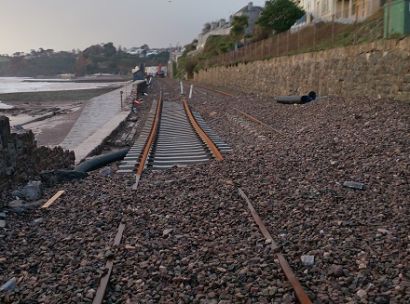NEW funding worth up to £80 million has been announced to build a higher and more resilient sea wall at Dawlish in south Devon, where storm-driven seas frequently cause damage to the main line railway.
Bad weather destroyed part of the line in early 2014, blocking the only railway to Plymouth and Cornwall for six weeks, but lesser storms often deluge trains with sea water and wash away ballast. The cost of restoring the railway in 2014 was £40 million, but that does not include the disruption suffered by the regional economy.
The Department for Transport has also published a new programme of wider investment in the region entitled ’Investing in the South West’, which is being launched today by transport secretary Chris Grayling during a visit to Dawlish.
He said: ‘We cannot allow the disruption and damage endured by Dawlish and the South West to happen again. This significant investment demonstrates our cast-iron commitment to delivering a resilient and safe railway, giving passengers, businesses and residents confidence in a reliable service.
‘With up to £80 million of funding available to create a rigorous set of defences, this new sea wall will help protect this vital route, building on our ambitious plans to grow this region’s economy and prosperity through stronger transport connections.’
Work on the new sea wall will begin in the spring and is expected to be complete by 2021. The government had previously provided £15 million for Network Rail to design more robust defences, including strengthening of the cliffs along the railway towards nearby Teignmouth.
The DfT added: ‘Investing in the South West includes a summary of the government’s commitment to ongoing investment in the region to improve the connectivity across all modes of transport – rail, bus and roads for both cars and bicycles.’
Some transport campaigners have been calling for a new inland route to avoid the fragile sea wall section, possibly by reviving the former Southern main line between Exeter and Plymouth. The cost of such a scheme has been put at least £600 million.


